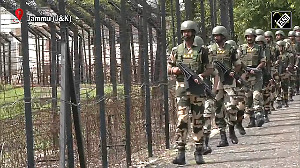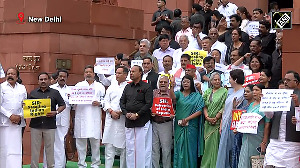 The Reserve Bank of India might further tighten its monetary policy if inflation did not come down significantly by the end of this month, Prime Minister's Economic Advisory Council chairman C Rangarajan said on Thursday.
The Reserve Bank of India might further tighten its monetary policy if inflation did not come down significantly by the end of this month, Prime Minister's Economic Advisory Council chairman C Rangarajan said on Thursday.The central bank is slated to review its credit policy on January 25.
Rangarajan said RBI's action (likely quantum of rise in policy rates) would depend on price behaviour, especially of food items, between December and January. He said if food inflation persisted, it would feed into general inflation.
"We still have three weeks to go (for January-end). If the inflation rate comes down significantly, then there may not be any need for action.
"But on the other hand, if inflation remains sticky, then action will be required," Rangarajan told reporters on the sidelines of the Skoch summit in New Delhi.
He also said inflation was likely to come down to 7 per cent by the end of December and decline further to 6-6.5 per cent by the end of March.
He, however, said inflation above 4 per cent would be uncomfortable, and cautioned that food inflation should not be allowed to spread into other sectors.
"We have always thought that inflation rate should remain close to 4 per cent. Therefore, I would regard any inflation above that level as uncomfortable," he explained.
Rangarajan also said there was no need for any extra borrowing by the government in the current financial year and the fiscal deficit target of 5.5 per cent by March-end
He said the liquidity situation was expected to improve in the current quarter on higher government spending.
'No tax worse than inflation'
Home Minister P Chidamabaram, also present on the occasion, said there was no tax worse than inflation and expressed doubt on whether the government had all instruments to check price rise.
"Inflation is high, food inflation is very high . . .
We are not sure whether we have all the tools in hands to control food inflation," he said.
The November headline inflation was 7.48 per cent. Despite a high statistical base of last year, wholesale food inflation for the week ended December 18 had touched a 10-week high of 14.44 per cent, as prices of vegetables, particularly onion, soared.
Chief Economic Advisor Kaushik Basu, who attended the summit, said the current inflation was because of sector-specific price increases and we might have to live with it.
He said cartels among traders, who were blocking the movement of new entrants, were responsible for high prices of onions, currently selling at Rs 60-80 per kg.












